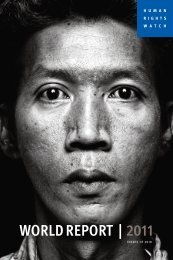SUPREME COURT OF CANADA CITATION: Alberta v. Hutterian ...
SUPREME COURT OF CANADA CITATION: Alberta v. Hutterian ...
SUPREME COURT OF CANADA CITATION: Alberta v. Hutterian ...
Create successful ePaper yourself
Turn your PDF publications into a flip-book with our unique Google optimized e-Paper software.
equirement universal. The photograph taken at the time of issuance of the licence is placed in theProvince’s facial recognition data bank. There were about 450 Condition Code G licences in<strong>Alberta</strong>, 56 percent of which were held by members of <strong>Hutterian</strong> Brethren colonies. The WilsonColony of <strong>Hutterian</strong> Brethren maintains a rural, communal lifestyle, carrying on a variety ofcommercial activities. They sincerely believe that the Second Commandment prohibits them fromhaving their photograph willingly taken and objected to having their photographs taken on religiousgrounds. The Province proposed two measures to lessen the impact of the universal photorequirement but, since these measures still required that a photograph be taken for placement in theProvince’s facial recognition data bank, they were rejected by the members of the Wilson Colony.They proposed instead that no photograph be taken and that non-photo driver’s licences be issuedto them marked “Not to be used for identification purposes.” Unable to reach an agreement with theProvince, the members of the Wilson Colony challenged the constitutionality of the regulationalleging an unjustifiable breach of their religious freedom. The case proceeded on the basis that theuniversal photo requirement infringes s. 2(a) of the Canadian Charter of Rights and Freedoms. Theclaimants led evidence asserting that if members could not obtain driver’s licences, the viability oftheir communal lifestyle would be threatened. The Province, for its part, led evidence that theadoption of the universal photo requirement was connected to a new system aimed at minimizingidentity theft associated with driver’s licences and that the new facial recognition data bank wasaimed at reducing the risk of this type of fraud. Both the chambers judge and the majority of theCourt of Appeal held that the infringement of freedom of religion was not justified under s. 1 of theCharter.Held (LeBel, Fish and Abella JJ. dissenting): The appeal should be allowed.
















